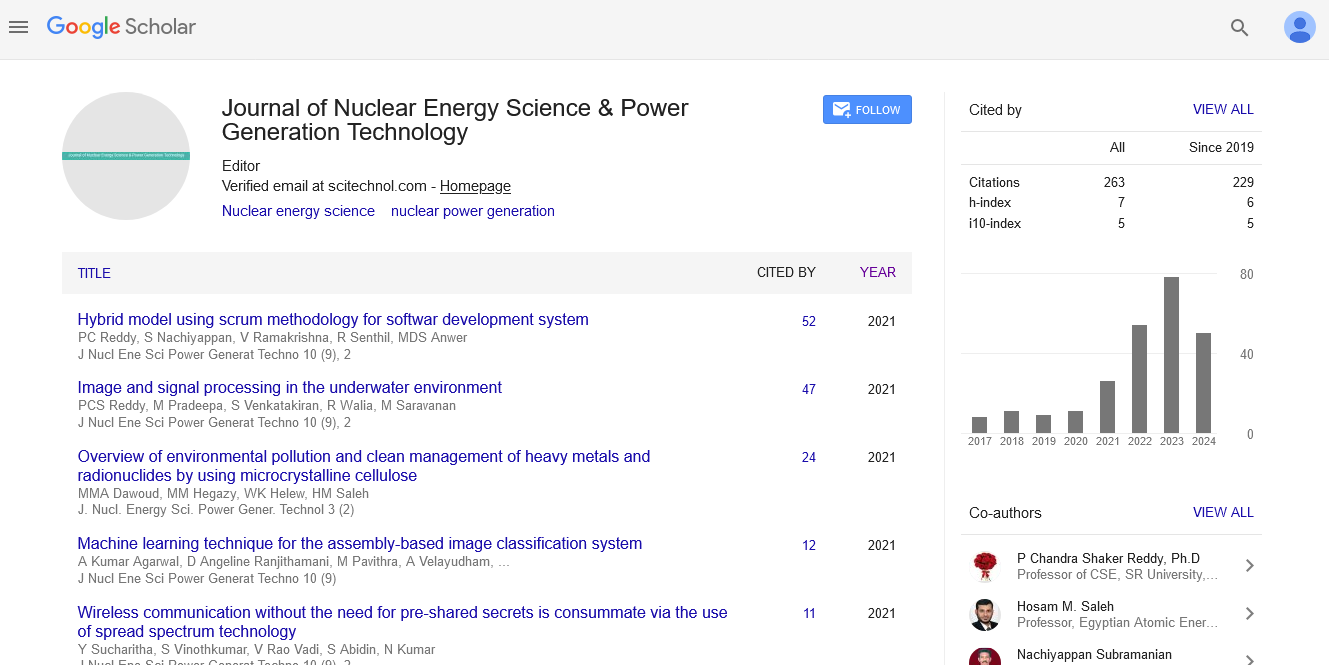Bioenergy and carbon sequestration in India: A critical analysis of climate change and CO2 standards in the environment
Tabrez Ahmad
University of Petroleum & Energy Studies, India
: J Nucl Ene Sci Power Generat Technol
Abstract
The success of the international community in keeping the global temperature rise to within 2°C is dependent on the large-scale deployment of bioenergy carbon capture and storage. Therefore, the sequestration and reduction of emissions over the next three decades will potentially have a substantial impact on long-term opportunities to stabilize levels of atmospheric CO2 and mitigate impacts of climate change. Stabilizing atmospheric CO2 would “require a transformation of the global energy system, including reductions in the demand for energy and changes in the mix of energy technology and fuels. Now it requires focus for the deployment of carbon capture and storage technology as well as the development of a sufficiently large biofuels industry. The burning of fossil fuels, oil, gas and coal, have provided a greater concentration and therefore increased the level of carbon dioxide (CO2) in the atmosphere. The enhancement of CO2 in the atmosphere —from about 280 to more than 380 parts per million (ppm) over the last 250 years—is creating greater global warming. It has adverse and sufficient impacts on increased frequency and intensity of wildfires, sea-level rise; droughts, floods, and tropical storms; changes in the amount, timing, and distribution of rain, snow, and runoff; and disturbance of coastal marine and other ecosystems. The higher content of CO2 in atmosphere is also raising the absorption of CO2 by seawater, lowering the PH value of sea water and making it more acidic, creating disruptive impacts on marine plankton and coral reefs. Economically feasible and viable technological strategies are needed to resolve the growing serious impacts of raised atmospheric CO2. India needs to develop ways to reduce human-caused CO2 emissions and to remove CO2 from the atmosphere. This article explores some of the legal challenges in developing this industry, specifically the land-use implications, trade and economic issues and the broader environmental legal context. It is argued that without addressing each of these it is unlikely that the 2°C target will be achievable.
Biography
Tabrez Ahmad is doctorate in Cyber Law & IPR from AMU Aligarh. He is working as Professor and Dean at University of Petroleum & Energy Studies (UPES) School of Law. Prior to joining UPES he worked as, Director, Alliance School of Law, Bangalore, Professor of Cyber Law at, KIIT University, Mentor at Technology Business Incubator, NSTEDB, Govt. of India and founding faculty at NUJS Kolkata. Dr. Ahmad is a prolific speaker in the areas of Cyberlaw, IPR & Energy Law and has been the resource person at Biju Pattanaik State Police Academy, Orissa State Judicial Academy, SIPARD Tripura, ICCC Egypt, IIPLA Dubai, IIPLA London, BIT’s China, 22nd WMSCI USA, CII, ASSOCHAM, ICLA, CIPAM, ICCC, 6th WIPF, 5th & 11th GIPF, 23rd Convergence India, Meetings International Singapore & Bureau of Police Research Development Govt. of India. He has also practiced for a while at the bar of Delhi High Court and Supreme Court of India. He has authored a pioneering book entitled “Cyber Law, E-commerce and M-commerce”, and published more than 100 papers in reputed journals. He is an active blogger and also on the editorial board of various journals including, JIPR of CSIR, JPL of Canadian Center of Science and Education, Journal of World Review of Business Research Australia etc. As per the New York based Social Science Research Network rankings, he is ranked among the Top 200 Law Authors in the World. He is among the IPLEADERS-2019 Top 100 most followed LinkedIn lawyers and has been ranked at 13th in the world.
E-mail: tabrezahmad7@gmail.com
 Spanish
Spanish  Chinese
Chinese  Russian
Russian  German
German  French
French  Japanese
Japanese  Portuguese
Portuguese  Hindi
Hindi 

